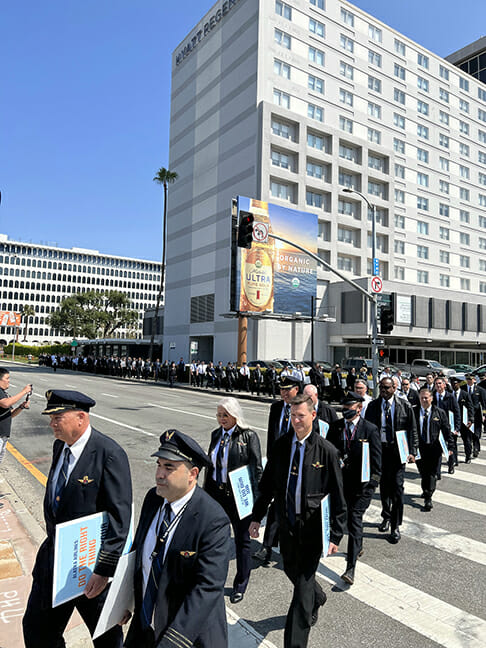
Calls Out Republic CEO for Suggesting Qualification Rules are Arbitrary, Not Science-Based
The Air Line Pilots Association, Int’l (ALPA), the world’s largest nongovernmental aviation safety organization, today criticized both SkyWest Airlines and Republic Airways for their reckless attempts to avoid proven air safety regulations for pilot training and qualifications. SkyWest Airlines failed to address the significant safety concerns ALPA raised in a recent filing with the Department of Transportation (DOT) related to the company’s bid to reinvent its small-community operations as a charter service and avoid landmark first officer qualification (FOQ) requirements. The union also took strong exception to comments made by the CEO of Republic Airways, which is also petitioning the DOT for special treatment, suggesting that the safety standards set by the federal government under the FOQ framework are arbitrary and not based on science, even implying that there’s no difference between a pilot with 300 hours of flight experience and one with 1,500.
“SkyWest and Republic Airways are two peas in a pod—a very dangerous pod. They both seek to skirt critical safety rules—rules written in blood—in order to save a buck and shortchange their workers,” said Capt. Joe DePete, ALPA president. “SkyWest didn’t even pretend to address the very serious safety concerns we raised about their scheme, and Republic Airways should have its application denied simply based on the ignorance of the comments made by their CEO. Our entire aviation safety ecosystem is based on science, on facts—and the recognition that safety should always be put ahead of profit. The two companies’ petitions are based on bad faith and deceptive practices.”
SkyWest’s misguided attempt to shift flying from Federal Aviation Regulation (FAR) 121 to FAR 135 introduces unnecessary risk to passengers and the system and reflects a failure to learn the lessons of the “One Level of Safety” regulations. In 1995, after a series of airline accidents that killed dozens of individuals, the Federal Aviation Administration (FAA) changed the FARs to ensure scheduled passenger operations in airplanes with more than nine seats were conducted under Part 121. On-demand charters, however, can be operated with aircraft up to 30 seats under FAR Part 135.
“For years, regional airlines and have tried to divert attention away from their failing business model by complaining there is an inadequate supply of qualified pilots in America, despite the fact that the United States has more certified pilots than available jobs,” added DePete. “Since the pandemic, they have ramped up their false rhetoric and are now threatening to lower safety standards and abandon small communities, despite receiving billions in federal support to service them—all so they don’t have to invest in their workers and can increase their bottom line. These bad business practices should not be allowed to threaten the safety of America’s skies.”
Earlier this month, ALPA also pushed back against an attempt by Republic Airways seeking an exemption from pilot training qualification and experience requirements for aspiring aviators enrolled in the company’s private flight academy, arguing that their training program is equal to that of the U.S. military and trainees should be able to operate airline aircraft after 750 flight hours of experience. In an interview with a local Boston news station, Republic Airways CEO Bryan Bedford said, “there’s no science behind 1500 hours.”
The FOQ law and resulting regulations were passed by Congress in the Airline Safety and FAA Extension Act of 2010 after four high-profile fatal airline accidents occurred over a six-year period, including Continental Connection Flight 3407, operated by Colgan Air. These airline accidents, which killed scores of passengers, focused the nation’s attention on how to improve airline safety, and aviation stakeholders and elected officials responded. Among numerous significant airline safety improvements included in the bill was strengthening pilot training, qualification, and experience requirements to include, for example, specific training for stall recognition and recovery and flight in adverse weather conditions. As a result, the fatality rate for U.S. passenger airlines dropped by 99.8 percent.These strengthened pilot-certification requirements have made U.S. skies the safest in the world.



























































































































